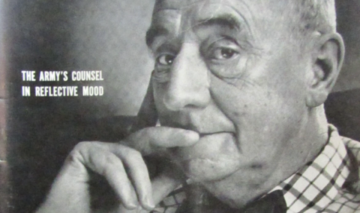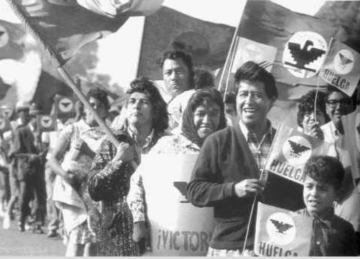by Mark Harvey
Most of the “better sort” were not genuine Sons of Liberty at all, but timid sycophants, pliant instruments of despotism… —Carl Lotus Becker
 It doesn’t take a lot of effort to be a bootlicker. Find a boss or someone with the personality of a petty tyrant, sidle up to them, subjugate yourself, and find something flattering to say. Tell them they’re handsome or pretty, strong or smart, and make sweet noises when they trot out their ideas. Literature and history are riddled with bootlickers: Thomas Cromwell, the advisor to Henry VIII, Polonius in Hamlet, Mr. Collins in Pride and Predjudice, and of course Uriah Heep in David Copperfield.
It doesn’t take a lot of effort to be a bootlicker. Find a boss or someone with the personality of a petty tyrant, sidle up to them, subjugate yourself, and find something flattering to say. Tell them they’re handsome or pretty, strong or smart, and make sweet noises when they trot out their ideas. Literature and history are riddled with bootlickers: Thomas Cromwell, the advisor to Henry VIII, Polonius in Hamlet, Mr. Collins in Pride and Predjudice, and of course Uriah Heep in David Copperfield.
There are some good words to describe these traits: sycophant, kiss-ass, toady, lackey, yes-man. One of my favorites is the word oleaginous, derived from oleum. It means oily and one of the best examples of this quality is the senator from the oil state, Ted Cruz. That man is oilier than the Permian Basin—oilier than thou!
 There is something repulsive about lickspittles, especially when all the licking is being done for political purposes. It’s repulsive when we see it in others and it’s repulsive when we see it in ourselves It has to do with the lack of sincerity and the self-abasement required to really butter someone up. In the animal world, it’s rolling onto your back and exposing the vulnerable stomach and throat—saying I am not a threat.
There is something repulsive about lickspittles, especially when all the licking is being done for political purposes. It’s repulsive when we see it in others and it’s repulsive when we see it in ourselves It has to do with the lack of sincerity and the self-abasement required to really butter someone up. In the animal world, it’s rolling onto your back and exposing the vulnerable stomach and throat—saying I am not a threat.
We have a political class nowadays that is more subservient and submissive than the most beta dogs in a pack of golden retrievers. Most of them live in Washington DC and are Republicans. They are fully grown men and women, some in their autumnal years, still desperately yearning for a pat on the head or a chuck under the chin by President Trump. You see them crowding around him when he signs a bill, straining forward like children and batting their eyes with pick-me, pick-me smiles.
There are dozens of theories about a nation as a whole and individuals as separate beings willing to bow and scrape to an authoritarian figure. Hannah Arendt suggested that loneliness had a lot to do with it. She distinguished loneliness from solitude, the former being isolating and disempowering, the latter being a desirable state to think and reflect and meditate on things. Most of us know the paradox of feeling very lonely in certain crowds or with certain people and not lonely at all on our own in the right setting.

But if I’m understanding Arendt, she suggests that feeling powerless, lonely, and isolated gives people a desire to belong to any group—just to belong. And God knows modern America can feel lonely, made ever more isolating by the twin scourges of social media and the smart phone.
Watching men and women spend dear money while making long journeys from Montana, Oklahoma and Nebraska to witness Trump’s inauguration, I don’t get the sense that they’re there to root for carefully crafted policies that are going to help their lot in life. Challenged in interviews to elaborate on how tariffs will lower food prices or what his solution is to health care, they inevitably resort to tropes about what a great businessman he is.
It’s clear that they didn’t come for any clear vision of the nation’s future—because there isn’t one—they came for something possibly more important on their Maslowian list of needs: belonging. Even if very few can spot Ukraine on a map or understand that in his first week of office Trump would kill Biden’s efforts to lower the prices of their insulin or amlodipine, they can spot the hats and sweaters and buttons that signal one tribe, one clan.
The need to belong is entirely understandable. It’s felt perhaps most poignantly in adolescence when children are becoming adults and testing where they fit in the little cruel and artificial societies of high school. The football teams, the glee clubs, the debate clubs and even the associations of the outcast “weirdos” offer a sense of belonging. We all need a tribe of some sort.
But how that’s translated into national politics with full grown adults and how the savvy politicians prey upon that need is where things get dangerous and strange. One of the easiest ways to fit into a tribe is to genuflect to the leader, no matter his or her obvious deficiencies and hypocrisy. When the self-proclaimed devout worship a man who probably couldn’t cite more than one verse from the Bible and then scorn a bishop asking for him to have compassion for the weak, meek, and frightened, our national ethos is dangerously infirm.
But the intermediaries—our senators and congresspeople and justices—are meant to counter the effects of mass psychology and mass sycophancy. That’s how the whole system was designed way back during that hot 1787 summer in Philadelphia. And there still are brave people like Tammy Duckworth, Adam Kinzinger, Sonia Sotomayor, and Liz Cheney sticking their necks way out in a time of mass psychosis.
Yet almost every single Republican senator and congressperson walks around with that self-abasing smile, approving singularly unqualified cabinet secretaries, voting for things that will definitely hurt their constituents, bowing and scraping, and generally forgetting any ideals of this country—if they ever even subscribed to those ideals.
The corollary to the revulsion we feel witnessing lickspittles is the light in our hearts when we witness genuine courage. The reason Rosa Parks will long be remembered with unalloyed admiration is because she wouldn’t get to the back of the bus where “colored” people were meant to ride despite it being 1955, in the cauldron of racist America: Montgomery, Alabama.
The reason Cesar Chavez is revered by millions of Latinos and farmworkers of every stripe is because he stood up for the rights of underpaid and overworked fruit pickers. Chavez was threatened, surveilled and discredited by the most powerful in the private sector and the most powerful in the government. Because his parents were migrant workers themselves, he ended up attending close to thirty different schools before he completed his last year of formal education, eighth grade. I don’t know what he was paid as a farmworker but it was likely between $2 and $5 per day in those times. Seasonal farmworkers still don’t have the best wages or working conditions but Chavez’s courage and determination have certainly made things better.

Despite our destructive and entirely unnecessary regressions away from the ideals of a democratic society, we have these wonderful moments of heroism when some awkward or disenfranchised person stands up to the bully. One of my favorites is when Joseph Welch, then senator from Massachusetts, confronted the insidious Joe McCarthy during McCarthy’s efforts to root out communism in American life. After witnessing weeks of McCarthy destroying the lives and reputations of dozens of innocents, Welch finally asks —in a televised hearing—” “Have you no sense of decency, sir, at long last? Have you left no sense of decency?”
Welch, an accomplished lawyer and senator, was by no means disenfranchised but he had that unmistakable je ne se crois quality of decency etched on a kindly face. It would be hard to imagine that face ever contorting itself into the groveling aspect of, say, a Vivek Ramaswamy.

George Orwell, Oscar Wilde and Coco Chanel have all been credited with saying, “Nature gives you the face you have at twenty. Life shapes the face you have at thirty. But at fifty you get the face you deserve.” There’s a photo I love of Cesar Chavez on his 300-mile protest march from Delano to Sacramento. In the photo, he’s carrying a sign that says Huelga (strike in Spanish), his pompadour is blowing in the wind, and he is looking into the middle distance with an expression that looks to me like both courage and joy. Behind him, a woman in a kerchief carrying a sign that says Victoria wears an expression of joy. And behind her, a woman carrying a flag has her chin raised in a look of defiance.
Despite getting paid about 90 cents an hour and getting covered in toxic pesticides all the workday, these people carry themselves with a hard-earned dignity on their faces. They have the faces they deserve.
God knows we need more Rosa Parks, Cesar Chavezes and Joseph Welches. Their paths standing up to the insidious, the virulent, and the unjust, had to have been deeply lonely. But despite that loneliness, they decided not to fold to conformity. And it would have been easier to conform: to go to the back of the bus, to allow McCarthy’s lies and cruelty, to work for $5 per day and with next to no rights.
We’ve entered an era where there will be great pressure and temptation to comply, obey, and acquiesce. That’s what many of our scared, lonely compatriots are doing. That’s what many of our craven politicians are doing. Let’s not. Let’s find within us some of Rosa Parks, Joseph Welch, and Cesar Chavez.
